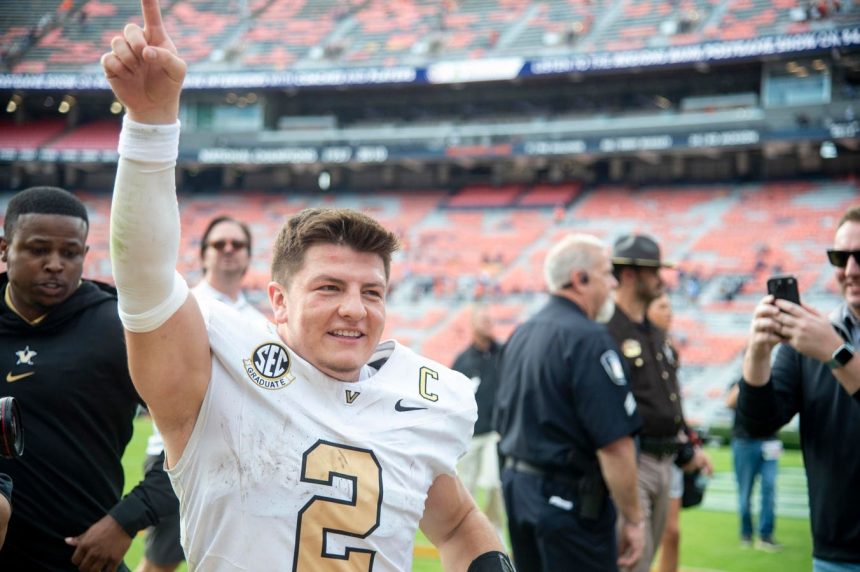The NCAA suffered another legal defeat on Tuesday as a U.S. District Court granted a preliminary injunction to Vanderbilt quarterback Diego Pavia, allowing him to play next season despite the NCAA’s existing eligibility rules for junior college (JUCO) transfers. Pavia, a key figure in Vanderbilt’s historic victory over Alabama, transferred from New Mexico State after starting his collegiate career at a JUCO. This season was meant to be his only one with the Commodores, but his lawsuit, filed in November, challenged the NCAA’s eligibility rules on antitrust grounds. This ruling, while specific to Pavia, carries significant implications for other JUCO transfers and potentially for the NCAA’s broader ability to enforce eligibility regulations.
A preliminary injunction is a court order preventing a specific action, in this case, the NCAA enforcing its eligibility rules against Pavia. It’s a temporary measure employed when a full trial isn’t immediately feasible. To secure a preliminary injunction, the plaintiff must demonstrate both potential “irreparable harm” without the injunction and a likely chance of success in a full trial. In Pavia’s case, the court recognized that his collegiate career would conclude before a full trial could take place, constituting irreparable harm. Judge William Campbell, after analyzing Pavia’s arguments, also determined that he had a strong likelihood of prevailing in a full trial. While the NCAA can theoretically pursue the case and win a full trial, this seems improbable given the judge’s initial assessment.
The core of Pavia’s argument centers on antitrust law. He contends that by limiting JUCO transfers’ eligibility and counting their JUCO years against their four allowable NCAA competition years, the NCAA is unlawfully restraining the market for college football players. The NCAA countered, citing precedent, that eligibility rules are non-commercial and thus exempt from antitrust scrutiny. However, Judge Campbell agreed with Pavia that the landscape of college sports has fundamentally changed since the landmark Alston ruling in 2020, which allowed for Name, Image, and Likeness (NIL) compensation. The court reasoned that with the advent of NIL, rules determining player eligibility are inherently commercial in nature. Furthermore, the court highlighted the competitive harm caused by limiting JUCO players’ eligibility, arguing that it incentivizes athletes to enroll directly in NCAA institutions rather than junior colleges. The NCAA’s defense, focusing on the preservation of amateurism and the supposed detriment of extended academic careers, failed to persuade the judge.
While the ruling directly impacts only Pavia, it casts a shadow over the NCAA’s handling of other JUCO transfer cases. The NCAA has faced similar preliminary injunctions in other areas, notably regarding NIL rules, where they ultimately chose not to enforce the challenged regulations. While the NCAA has stated its intention to maintain its current JUCO transfer eligibility rules, this strategy deviates from their previous responses to preliminary injunctions. This stance exposes them to a potential wave of similar lawsuits from other JUCO transfers. Legal experts believe that the NCAA’s arguments are unlikely to hold up in other courts, making a change in their rules the most pragmatic course of action.
This case raises questions about the future of NCAA eligibility rules. While some speculate about the possibility of unlimited eligibility, this appears unlikely. The ruling is narrow in scope, specifically addressing JUCO transfers and Pavia’s unique circumstances. It doesn’t invalidate the NCAA’s existing five-year/four-season rule, which, although potentially subject to future challenges, remains intact. While this legal setback is undoubtedly problematic for the NCAA, the suggestion of non-students playing college sports remains far-fetched. The core issue in this case is the disparate treatment of JUCO transfers, a nuance not applicable to other eligibility regulations.
The NCAA faces limited viable options moving forward. An emergency appeal of the injunction seems unlikely to succeed. Pursuing a full trial against the same judge, who has already signaled his leanings, also appears futile. Ignoring the ruling and hoping to avoid further lawsuits is equally unrealistic. The most probable outcome is that the NCAA will eventually concede and amend its JUCO transfer eligibility rules. This appears to be the only strategically sound path, given the legal precedent set by Pavia’s case and the potential for a cascade of similar lawsuits. The NCAA’s continued resistance would likely result in further legal defeats, reinforcing the need for rule reform.



